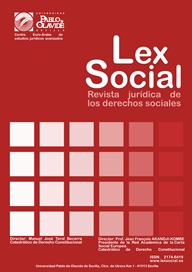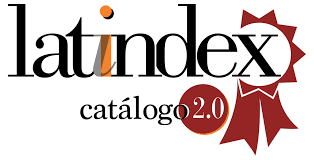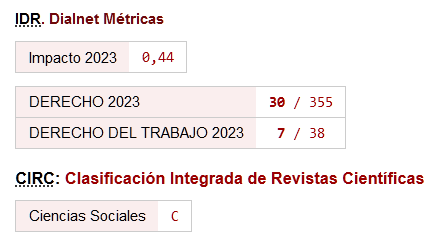The European Social Charter and emerging social rights: a closer look at the right to access environmental information
DOI:
https://doi.org/10.46661/lexsocial.3979Keywords:
Emerging social rights, Right to Access Environmental Information, European Social Charter, Favor libertatis principle, Welfare StateAbstract
Nowadays social rights protection constitutes a fundamental objective. In Europe, the Revised European Social Charter plays an important role as the guardian of the social welfare model. Its recognized status as Europe´s genuine Social Constitution is reflected in the fact that it offers the highest standard of social rights protection, including, naturally, emerging social rights. Thus, it seems interesting to study the right of access to environmental information as an emerging social right derived, in large part, from the generic social right to a healthy environment. This right, in very simple terms, is the right of the public to receive information related to the environment. This right is not a mere requirement of the Welfare State, but constitutes a vital and necessary minimum to protect the inherent dignity of all human beings and in the inviolability of the human person. This, in turn, allows individuals to effectively exercise other rights and freedoms, dependent, to a greater or lesser extent, on the environment and the information available thereof. This paper analyzes the materialization and the normative and jurisprudential evolution of the right to access environmental information. The paper also examines its recognition and effectiveness through the European Social Charter and the interpretation made by its monitoring body, the European Committee of Social Rights. The author alludes to the convergences and divergences between the fundamental rights protection systems at all levels, and promotes the necessary and prioritised application of the ESC as per the favor libertatis principle.
Downloads
References
ALSTON, P., “A Third Generation of Solidarity Rights: Progressive Development or Obfuscation of International Human Rights Law?”; Netherlands International Law Review, Vol. 29, n. 3, 1982, pp. 307-322.
ANDRUSEVYCH, A., y KERN, S. (eds.), Case Law of the Aarhus Convention Compliance Committee (2004-2016), Resource and Analysis Center Society and Environment, Lviv, 2016.
BOBBIO, N., El tiempo de los derechos, Ed. Sistema, Madrid, 1991.
BRILLAT, R., “The European Social Charter”, in ALFREDSSON, G., et al. (Eds) International Human Rights Monitoring Mechanisms: Essays in honour of Jackob Th. Moller, Martinus NIjhoff, Hague, 2009, pp. 503-515.
CABRA APALATEGUI, J. M., “Sobre la estructura y los límites de los derechos sociales”, Estudios de Deusto, Vol. 66/1, 2018, pp. 197-213.
CASADO CASADO, L. “El derecho de acceso a la información ambiental previa solicitud”, en PIGRAU I SOLÉ, A. (Coord.) Acceso a la información, participación pública y acceso a la justicia en materia de medio ambiente: diez años del convenio de Aarhus, 2008, pp. 225-298.
CASADO CASADO, L. “Acceso a la información, participación pública y acceso a la justicia en materia de medio ambiente: veinte años del Convenio de Aarhus”, Revista Catalana de Dret Ambiental, Vol. 9, nº 1, 2018.
COLIVER, S., “The Right to Information and the Expanding Scope of Bodies Covered by National Laws since 1989”, in P. Molnar (ed.) Free Speech and Censorship Around the Globe, Central European University Press, 2015.
DARBISHIRE, H., Proactive Transparency: The Future of the Right to Information?, World Bank, 2011.
DE JULIOS CAMPUZANO, A.: La dinámica de la libertad: Tras las huellas del liberalismo (Serie Derecho), Universidad de Sevilla, Sevilla, 1997, p. 279.
EBBESSON, J., “Public Participation and Privatisation in Environmental Matters: An Assessment of the Aarhus Convention”, Erasmus Law Review, Vol. 4, n. 2, 2011, pp. 71-89.
ESCOBAR ROCA, G., “Indivisibilidad y derechos sociales: de la Declaración Universal a la Constitución”, Lex social: revista de los derechos sociales, n. 2, 2012, pp. 47-61.
FERNÁNDEZ VALVERDE, R., “La integración de las exigencias del convenio de Aarhus en el sistema procesal español a través de la Ley 27/2006”, Estudios de derecho judicial (Ejemplar dedicado a: Examen del a nueva Ley de acceso a la información, participación pública y acceso a la justicia en materia de medioambiente), n. 137, 2007, pp. 35-114.
FRAGUAS MADURGA, L., “EL CONCEPTO DE DERECHOS FUNDAMENTALES Y LAS GENERACIONES DE DERECHOS”, Anuario del Centro de la Universidad Nacional de Educación a Distancia en Calatayud, n. 21, 2015, pp. 117-136.
GARCÍA GONZÁLEZ, G.: “La recepción de la Carta Social Europea en el ordenamiento español: aspectos jurídicos, políticos e institucionales (1978-2018)”, Revista del Ministerio de Trabajo, Migraciones y Seguridad Social-Derecho social internacional y comunitario, Vol. 137, 2018, p. 43.
GARCÍA MORALES, A. F., La justiciabilidad de los derechos económicos, sociales y culturales (DESC), Universidad Complutense, Madrid, 2002.
GARCIA PELAYO, M., “Estado social y democrático de Derecho en la Constitución española”, Las transformaciones del Estado contemporáneo, en sus Obras Completas, Vol. II, Centro de Estudios Constitucionales, Madrid, 1991, p. 1656
HERRERA ESPINOZA, A., MORENO OVANDO, P.I., ESCOBEDO FERNÁNDEZ, R.I., “El Acceso a la Información Ambiental”, Revista Mejicana de Derecho Constitucional, Iss. 29, 2013, pp. 219-243.
JANS, J. H., y VEDDER, H.H.B., European Environmental Law. After Lisbon, Europa Law Publishing, Groningen, 2012.
JIMEMA QUESADA, L., “El último bastión en defensa de los derechos sociales: La Carta Social Europea”, Revista Jurídica de la Universidad Autónoma de Madrid, n. 29, 2014, pp. 171-189.
JIMENA QUESADA, L., Social Rights and Polices in the European Union. New Challenges in a Context of Economic Crisis, Tirant lo Blanch-PUV, Valencia, 2016.
JIMENA QUESADA, L., Devaluación y Blindaje del Estado social y democrático de derecho, Tirant lo Blanch, Valencia, 2017.
JIMEMA QUESADA, L., “La retrospectiva del proceso de Turín: origen y trabajos preparatorios de la Carta Social Europea”, Revista del Ministerio de Trabajo, Migraciones y Seguridad Social, n. 29, 2018, pp. 1-26.
MORA GALIANA, J., “Preferencias axiológicas y valores jurídicos. Para una deontología profesional”, Cuadernos Electrónicos de Filosofía del Derecho, 2009, pp. 166-179.
KIMBER, C., “Understanding Access to Environmental Information: the European Experience”, in JEWELL, T., STEELE, J. (Coord.), Law in Environmental Decision-Making: National, European and International Perspectives, Oxford University Press, Oxford, 1998, pp. 139-161.
KISS, A., y SHELTON, D., Manual of European Environmental Law, Cambridge University Press, New York, 1993.
KRÄMER, L., “Transnational Access to Environmental Law”, Transnational Environmental Law Cambridge University Press, Vol 1, n. 1, 2012, pp. 95-104.
KRAVCHENKO, S., “Is Access to Environmental Information a Fundamental Human Right?”, Oregon Review of International Law, Vol. 11, 2009, pp. 227-266.
MARSHALL, T.H., Citizenship and Social Class: And Other Essays, Cambridge University Press, Cambridge, 1950.
MONEREO PÉREZ, J.L., “El principio de indivisibilidad e interdependencia en el sistema jurídico internacional multinivel de garantía de los derechos fundamentales”, Revista derecho del trabajo, n. 15, 2017, pp. 21-68.
NIVARD, C., “La justiciabilidad de los derechos sociales en el Consejo de Europa”, Revista Lex Social, Vol. 6, n. 2, 2016, pp. 12-33.
OLIVER, P., “Access to information and to justice in the EU. Environmental Law and the Aarhus Convention”, Fordham International Law Journal, Vol 36. n. 5, 2013, pp. 1423-1470.
PEDERSEN, O.W., “European Environmental Human Rights and Environmental Rights: A Long Time Coming”, Georgetown International Law Review, Vol 21, n. 1, 2009.
PÉREZ LUÑO, A.E., “Las generaciones de derechos fundamentales”, Revista del Centro de Estudios Constitucionales, n. 10, 1991, p. 205.
PÉREZ LUÑO, A.E., “Las generaciones de derechos humanos”, en ANSUÁTEGUI ROIG, F.J., RODRÍGUEZ URIBES, J.M., PECES-BARBA MARTÍNEZ, G., y FERNÁNDEZ GARCÍA, E. (Coords) Historia de los derechos fundamentales, Vol. 4, Tomo 1, 1998, pp. 359-395.
PIGRAU I SOLÉ, A. (Coord) Acceso a la información, participación pública y acceso a la justicia en materia de medio ambiente: diez años del convenio de Aarhus, Atelier, 2008.
RAZQUIN LIZARRAGA, J.A., “El Convenio de Aarhus”, Actualidad jurídica Aranzadi, nº 670, 2005, pp. 1-3.
ROESLER, S., “The Nature of the Environmental Right to Know”, Ecology Law Quaterly, Vol 39, n. 4, 2012, pp. 1017-1019.
SALAZAR ORTUÑO, E., “Transparencia y acceso a la información ambiental”, en Valero Torrijos, J., Fernández Salmerón, M. (Coords) Régimen jurídico de la transparencia del sector público: del Derecho de acceso a la reutilización de la información, 2014, pp. 537-558
SALAZAR ORTUÑO, E., “El desarrollo del Convenio de Aarhus y la progresiva desaparición de obstáculos para el acceso a la justicia ambiental: reconocimiento en la jurisprudencia del Tribunal Supremo de la legitimación activa a las organizaciones no gubernamentales que trabajan a favor de la protección del ambiente”, Revista Aranzadi de derecho ambiental, n. 17, 2010, pp. 191-202.
SALCEDO BELTRÁN, C., “La protección de los derechos sociales a escala europea: de la confrontación ‘presente’ a la ineludible integración ‘futura’”, Revista del Ministerio de Trabajo, Migraciones y Seguridad Social-Derecho social internacional y comunitario, Vol. 137, 2018, pp. 79-134.
SALCEDO BELTRÁN, C., “Derechos sociales y su garantía: la ineludible aprehensión, disposición e implementación de la Carta Social Europea (Constitución Social de Europa)”, Revista de Derecho Social, Vol. 83, 2018, pp. 45-74.
SANDS, P., y PEEL, J., Principles of International Environmental Law, 2012, Cambridge University Press, Cambridge.
SHELTON, D., “Human Rights and the Environment: What Specific Environmental Rights Have Been Recognized?”, Denver Journal of International Law and Policy, Vol. 35, n. 1, 2006.
SOLER TORMO, J.I., La configuración constitucional del medio ambiente como derecho, tesis doctoral, Universidad de Valencia, 2016.
STANGOS, P., “La Charte Sociale Européenne et le Comité Europeen des Droits Sociaux », Conferencia impartida en Les rencontres d’automne AFDT sur Les périmètres de l’Europe Sociale, septiembre, 2017.
TUR AUSINA, R., “Luces y sombras de los derechos sociales en la Carta de los Derechos Fundamentales de la Unión Europea”, Revista Europea de Derechos Fundamentales, n. 13, 2009, pp. 323-349.
VASAK K., “Human Rights: A Thirty-Year Struggle: the Sustained Efforts to give Force of law to the Universal Declaration of Human Rights”, UNESCO Courier 30:11, Paris: United Nations Educational, Scientific, and Cultural Organization, November 1977.
VASAK K., “For the Third Generation of Human Rights: The Rights of Solidarity”, Inaugural Lecture to the Tenth Study Session of the International Institute of Human Rights, Estrasburgo, 1979.
ZULUAGA MADRID, J., “Access to Environmental Information from Private Entities: A Rights-Based Approach”, Review of European Community and International Environmental Law, Vol. 26, n. 1, 2017, pp. 38-53.
Downloads
Published
How to Cite
Issue
Section
License
Copyright (c) 2019 Lex Social: Revista de Derechos Sociales

This work is licensed under a Creative Commons Attribution-NonCommercial-NoDerivatives 4.0 International License.
-
Atribución — Usted debe dar crédito de manera adecuada, brindar un enlace a la licencia, e indicar si se han realizado cambios. Puede hacerlo en cualquier forma razonable, pero no de forma tal que sugiera que usted o su uso tienen el apoyo de la licenciante.
-
NoComercial — Usted no puede hacer uso del material con propósitos comerciales.
-
CompartirIgual — Si remezcla, transforma o crea a partir del material, deberá difundir sus contribuciones bajo la misma licencia que el original.



 @Lex Social
@Lex Social Linkedin
Linkedin @lexrevista.bsky.social
@lexrevista.bsky.social



